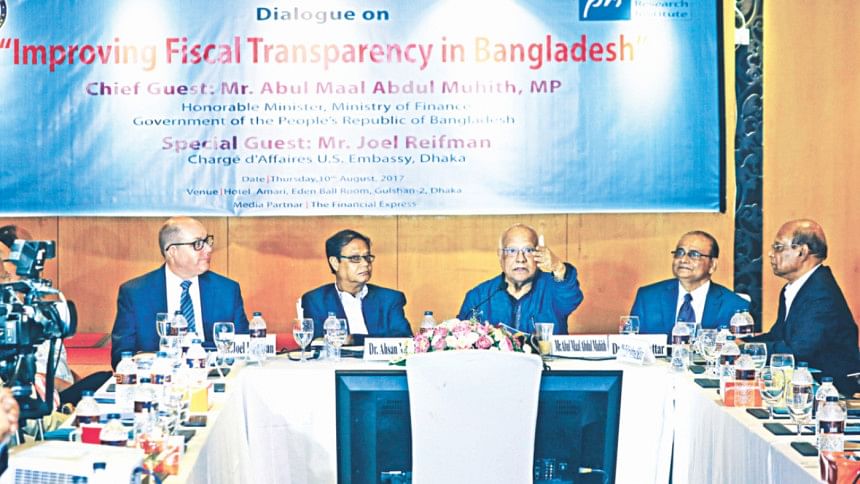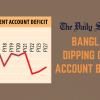Ensure transparency in public spending

Bangladesh does not make public enough information related to fiscal policies and measures taken in budget every year to ensure transparency, said analysts yesterday.
At present, the government publishes some budget information but not enough to ensure an informed public debate, said Ahsan H Mansur, executive director of the Policy Research Institute.
Mansur's comment came while presenting a paper on improving fiscal transparency in Bangladesh at a dialogue held at Amari Dhaka.
PRI, a private research organisation, arranged the event, which was attended by Finance Minister AMA Muhith.
He made the comment citing that Bangladesh is classified under category C3 in the Open Budget Index prepared by the International Budget Partnership.
This means the country does not disclose adequate information related to fiscal issues, he added.
In his speech, Muhith said fiscal transparency is very important for ensuring the sustainability of reforms.
He said the paper placed many good suggestions, some of which could have been implemented had they been placed a couple of years ago.
Since the national election is approaching, it will not be a good year to initiate reforms, he said, adding that there would be no real discussion until 2020.
Muhith also stressed on continued effort to cut poverty. “Poverty reduction has to be the core of government objectives,” he added.
In his paper, Mansur cited the 2015 Fiscal Transparency Report of the US State Department, which said Bangladesh did not meet the minimum requirements of fiscal transparency and it did not make significant progress towards meeting the minimum requirements.
“Information on earnings from state-owned enterprises is included in the supplementary budget documents. However, information on allocation to the state-owned enterprises is not clearly presented and discussed in the budget,” he said.
Fiscal transparency can be seen as an end in itself and also as a means to promote good governance, accountability and efficient resource allocation.
The local government allocations are non-transparent, he said.
Citing the public-private partnership initiatives by the government, he suggested for framing modalities for fiscal accounting to ensure transparency in this area.
He also recommended for fixing revenue collection target based on reality.
“Revenue projection is done in an ad hoc manner, which often results in unrealistic projections,” Mansur said, adding that the budget presentation process lacks any analysis of major expenditures and revenue measures, and their contribution to policy objectives.
In particular, estimates of current and future budgetary impact are not provided, he said, adding that poverty and social impact analysis of the new fiscal measures are not generally presented to the parliament as part of budget preparation.
Citing the Production Sharing Contracts (PSC) signed by the government with international oil companies on a case-to-case basis, Mansur said the contracts are not published.
“PSCs should be published for public access. That is our legitimate demand,” he said, adding that subsidies given by the government to various state agencies are also not explicitly recorded. Mansur also said Bangladesh's defence and security policy scores poorly in terms of transparency.
Information on the defence budget include only aggregate figure and it does not cover all defence-related spending, especially regarding allocation or procurement.
Given the importance of defence budget, there should be more information available to parliament and people for an informed public debate on the size and composition in the current security context.
Mansur went on to cite neighbouring India as an example. India's defence budget explicitly lists details regarding allocation for capital expenditures, revenue expenditure and other information.
Bangladesh's military expenditure as a share of total expenditure is high in comparison with comparative countries like India and Vietnam, which also have large and strong standing armed forces, Mansur added.
“There is a major concern relating to the treasury's contingent liabilities emerging from the operations of the state-owned public non-financial and financial institutions,” said Sadiq Ahmed, vice-chairman of PRI.
The contingent liability of the institutions amounted to Tk 3,254 billion in fiscal 2013-14, which was 24 percent of that year's GDP.
Similarly, the value of the non-performing loans of public banks that year was Tk 308 billion, which was 1.7 percent of GDP, he said.

 For all latest news, follow The Daily Star's Google News channel.
For all latest news, follow The Daily Star's Google News channel. 








Comments